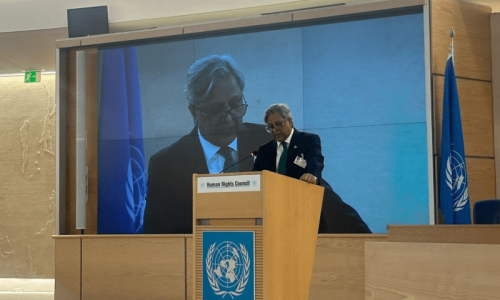• IMF team due in Islamabad this week for second review of $3bn package
• Aurangzeb chalks out economic strategy in inaugural press briefing
• Hints at possible reduction in central bank’s policy rate
• Pledges to rapidly implement digitalisation of tax system, PIA privatisation
ISLAMABAD: The government declared its intention on Tuesday to negotiate a “longer and larger” economic bailout package with the International Monetary Fund (IMF), targeting to sustain the nascent macroeconomic stability.
In his first formal media interaction after having a series of briefings, including on external account needs and fiscal situation, Finance Minister Aurangzeb Khan, a professional banker, also hinted at a potential reduction in the central bank’s policy rate, albeit with a disclaimer about the monetary policy committee’s autonomy.
Besides, Mr Khan pledged to rapidly implement comprehensive digitalisation of the tax system, from assessment to collection, aimed at enhancing transparency and widening the tax base. He also announced the imminent privatisation of the national flag carrier, Pakistan International Airlines (PIA).
The minister said the IMF team would be in Islamabad this week for a second review of the ongoing $3 billion Standby Arrangement (SBA).
“We would be very keen to start discussions on another EFF (Extended Fund Facility) with them” during these talks, he said, adding that further negotiations on the programme would be taken forward on the sidelines of the IMF and World Bank’s spring meetings in April at Washington.
Another official said talks with the IMF on the second and final review of the current SBA are scheduled for March 14 to 22.
During these talks, “we would at least kick-start the process and get this going. Let us see how they respond,” Mr Khan said, hoping that the two sides would discuss the blueprint of the next programme in April.
The minister did not commit if Pakistan would be seeking to augment the EFF with climate risk-related financing from the IMF, as Bangladesh recently secured $3.3bn under the Resilience and Sustainability Facility (RSF).
The minister said the government would soon move towards revenue realisation from wholesale businesses, real estate, and agriculture. He said that while agriculture was in a provincial domain, the federal government would start with effective taxation in the wholesale business and address the mismatch between tax contribution and GDP share.
Regarding the final review of the current SBA, the minister said he was quite optimistic about the successful conclusion because of compliance with the SBA stipulations. An official said that 24 out of 25 policy actions had been met and the remaining was inconsequential.
Mr Khan said it was very important for Pakistan to give permanence to recent macroeconomic stability that required a longer and larger programme because this would also have implications in the upcoming budget for implementation soon after.
He said it was encouraging that the year 2023 ended in a much better position than a year before, particularly regarding macroeconomic stability that should gradually lead to a higher growth rate. Otherwise, there was no magic wand to go into a high-growth mode without creating foreign exchange crises witnessed in the past, he said.
He said almost all the reform actions and structural benchmarks were on the table, everybody knew about them, and they have been part of all recent IMF programmes signed by all the successive finance ministers, from Asad Umar to Hafeez Shaikh to Shaukat Tarin and Miftah Ismail to Ishaq Dar.
“Unless structural benchmarks are completed, continuing with patchwork was no more the way to live with for a sovereign of 245 million with nuclear capabilities,” he said.
He said that in the real sense of urgency, the country now needed to move into the execution and implementation phase in all areas of economic reforms, as the prime minister was also very clear in the first session of the cabinet that a lot of discussions and debates had already taken place and there was no more need for a debating club.
There were a lot of analytical reports available, including that of the World Bank, that talked about turning the economy of over $300bn to $3 trillion by 2047, he said.
The finance minister said that beginning with the FBR reforms through digital expansion for transparency and better service, “we now need to stop leakages in various forms and shapes.”
As with his banking experience of expanding HBL’s customer base from 12 million in 2018 to 36 million in December 2023, Mr Khan said digitisation would be required for an end-to-end customer journey and for minimising human interactions, leading to efficiency.
He said the FBR now had enough data — such as utility bills, foreign trips, and taxes paid — to provide a complete picture.
“This is a low-hanging fruit, he said, adding that young data analytics teams would be hired immediately to process this data before sending them to field formations.
“We have already started working on who will give us expertise, who will be the implementation partner, and what the end-to-end journey for expanding the tax net will be. This will play a big role in plugging the revenue leakage,” he said.
Secondly, he said the government would now embark on the agenda of privatising state-owned enterprises (SOEs) “in a very big way,” starting with PIA immediately.
Mr Khan said his ministry would fully support Privatisation Minister Aleem Khan as PIA’s divestment was ready.
He said the new government would only provide a policy framework and let the private sector step in and lead the business, including through the public-private model.
The minister said inflation was a critical issue that could also be tackled in a phased manner through macroeconomic stability. He said the State Bank’s monetary policy committee was independent but insisted that he expected the policy rate to come down in due course because this was also very important for business.
Published in Dawn, March 13th, 2024














































